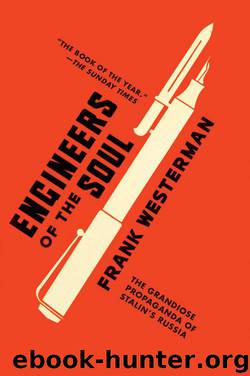Engineers of the Soul by Frank Westerman

Author:Frank Westerman [WESTERMAN, FRANK]
Language: eng
Format: epub
Tags: POL049000, HIS032000, ART049000, LIT004240
ISBN: 9781468305333
Publisher: The Overlook Press
Published: 2012-08-01T00:00:00+00:00
There wasn’t anything wrong with that, was there? I asked.
‘No, what he wrote was not the problem. The problem was that Monsieur Barbusse had seen the film before Stalin had.’ He and his colleagues, Igor Vasilyev told me, had long been puzzled about why the film had never been released. Finally they had set up their own investigation, which led them to the by-then-elderly son of the director. ‘He told us that the story surrounding The Black Maw was a secret his father had taken with him to his grave.’
What it boiled down to was that Stalin had found out about the article in Izvestia. Annoyed by the fact that he, as First Critic, had been passed over, he demanded an explanation from the head of the cinematographic service, Comrade Boris Shumyatsky. As soon as this Minister of Cinematographic Affairs heard that he was being summoned to the Kremlin, and why, he became paralysed with fear.
‘He thought his fate was sealed,’ Igor Vasilyev said. ‘That, in the wake of the Kirov affair, he would be branded an enemy of the people.’
The best form of defence, Shumyatsky concluded, was attack. He would lie to Stalin. And so he stated flatly that Henri Barbusse had been confused: the Frenchman had seen a film, but not The Black Maw. After all, that was still being edited! The entire misunderstanding, Shumyatsky continued, was prompted by jealous film-makers spreading an ugly rumour. The profession, it seemed, was still rife with sectarianism, but the minister promised to carry out a thorough investigation and to punish those responsible.
‘Back at his office, Shumyatsky decided to wipe out all traces of The Black Maw,’ Igor Vasilyev said.
‘Then it was a wonder that the rolls of film even survived,’ I commented.
‘Oh no,’ the archivist said. ‘He kept them tucked away on purpose. That way, if Stalin asked about it, he could produce them on the spot.’
The minister had of course summoned both Konstantin Paustovsky and the director. The three of them discussed the plan to conceal the whole project as quietly as possible. In order to avoid suspicion the final editing process would continue, albeit on a back burner. But Shumyatsky never presented the finished product, with its ‘great many authentically socialist moments’, for approval to the censor, let alone to the official distribution channels. The strategy he had chosen (burying the thing in the hope that Stalin would forget all about it) was risky, but the alternative (simply releasing the film) struck him as riskier still.
‘Just imagine,’ Igor Vasilyev said. ‘All that needed to happen was for one film critic to recall Barbusse’s article in Izvestia and heads would have rolled.’
‘Lying to Stalin was not what you’d call a minor misdemeanour,’ I suggested.
‘It was a direct violation of Article 58, counter-revolutionary activity, on a par with “squandering public funds”, “Trotskyite sabotage” or the “distribution of anti-Soviet propaganda”.’
The terminology was familiar to me by now. I nodded and said nothing. What could I possibly say?
Before I left, I told Igor Vasilyev about Yakov Rubinschtein, who he was and how he had met his fate.
Download
This site does not store any files on its server. We only index and link to content provided by other sites. Please contact the content providers to delete copyright contents if any and email us, we'll remove relevant links or contents immediately.
| African | Asian |
| Australian & Oceanian | Canadian |
| Caribbean & Latin American | European |
| Jewish | Middle Eastern |
| Russian | United States |
4 3 2 1: A Novel by Paul Auster(12360)
The handmaid's tale by Margaret Atwood(7741)
Giovanni's Room by James Baldwin(7309)
Asking the Right Questions: A Guide to Critical Thinking by M. Neil Browne & Stuart M. Keeley(5745)
Big Magic: Creative Living Beyond Fear by Elizabeth Gilbert(5733)
Ego Is the Enemy by Ryan Holiday(5400)
The Body: A Guide for Occupants by Bill Bryson(5067)
On Writing A Memoir of the Craft by Stephen King(4924)
Ken Follett - World without end by Ken Follett(4712)
Adulting by Kelly Williams Brown(4558)
Bluets by Maggie Nelson(4541)
Eat That Frog! by Brian Tracy(4507)
Guilty Pleasures by Laurell K Hamilton(4430)
The Poetry of Pablo Neruda by Pablo Neruda(4084)
Alive: The Story of the Andes Survivors by Piers Paul Read(4013)
White Noise - A Novel by Don DeLillo(3998)
Fingerprints of the Gods by Graham Hancock(3982)
The Book of Joy by Dalai Lama(3965)
The Bookshop by Penelope Fitzgerald(3834)
